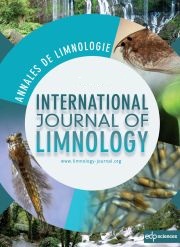Crossref Citations
This article has been cited by the following publications. This list is generated based on data provided by
Crossref.
Specziár, A.
2011.
Size-dependent prey selection in piscivorous pikeperch Sander lucioperca and Volga pikeperch Sander volgensis shaped by bimodal prey size distribution.
Journal of Fish Biology,
Vol. 79,
Issue. 7,
p.
1895.
Godlewska, M.
Frouzova, J.
Kubecka, J.
Wiśniewolski, W.
and
Szlakowski, J.
2012.
Comparison of hydroacoustic estimates with fish census in shallow Malta Reservoir – which TS/L regression to use in horizontal beam applications?.
Fisheries Research,
Vol. 123-124,
Issue. ,
p.
90.
György, Á.I.
Tátrai, I.
and
Specziár, A.
2012.
Relationship between horizontal hydroacoustic stock estimates and gillnet catches of surface-oriented fish in shallow Lake Balaton (Hungary).
Knowledge and Management of Aquatic Ecosystems,
p.
06.
Kaller, Michael D.
Kelso, William E.
and
Trexler, Joel C.
2013.
Wetland Techniques.
p.
197.
Specziár, A.
György, Á. I.
and
Erős, T.
2013.
Within‐lake distribution patterns of fish assemblages: the relative roles of spatial, temporal and random environmental factors in assessing fish assemblages using gillnets in a large and shallow temperate lake.
Journal of Fish Biology,
Vol. 82,
Issue. 3,
p.
840.
Muška, Milan
Tušer, Michal
Frouzová, Jaroslava
Draštík, Vladislav
Čech, Martin
Jůza, Tomáš
Kratochvíl, Michal
Mrkvička, Tomáš
Peterka, Jiří
Prchalová, Marie
Říha, Milan
Vašek, Mojmír
and
Kubečka, Jan
2013.
To migrate, or not to migrate: partial diel horizontal migration of fish in a temperate freshwater reservoir.
Hydrobiologia,
Vol. 707,
Issue. 1,
p.
17.
Mochek, A. D.
Borisenko, E. S.
Pavlov, D. S.
Chemagin, A. A.
and
Budaev, S. V.
2015.
Factors affecting the distribution of fish during receding flood in lower Irtysh: effects of water level and diurnal cycle.
Annales de Limnologie - International Journal of Limnology,
Vol. 51,
Issue. 2,
p.
89.
Putnam, Joel G.
Nelson, Justine E.
Leis, Eric M.
Erickson, Richard A.
Hubert, Terrance D.
and
Amberg, Jon J.
2017.
Using silver and bighead carp cell lines for the identification of a unique metabolite fingerprint from thiram-specific chemical exposure.
Chemosphere,
Vol. 168,
Issue. ,
p.
1477.
Laouar, Houcine
and
Djemali, Imed
2018.
Seasonal inter-calibration between acoustic and multi-mesh gillnets sampling for fish biomass assessment in reservoirs.
Journal of Applied Ichthyology,
Vol. 34,
Issue. 4,
p.
850.
Johnson, Garrett R.
Shoup, Daniel E.
and
Boswell, Kevin M.
2019.
Accuracy and precision of hydroacoustic estimates of Gizzard Shad abundance using horizontal beaming.
Fisheries Research,
Vol. 212,
Issue. ,
p.
81.
DuFour, Mark R.
Qian, Song. S.
Mayer, Christine M.
and
Vandergoot, Christopher S.
2019.
Evaluating catchability in a large-scale gillnet survey using hydroacoustics: Making the case for coupled surveys.
Fisheries Research,
Vol. 211,
Issue. ,
p.
309.
Koliada, Ievgen
Balk, Helge
Tušer, Michal
Ptáček, Ladislav
and
Kubečka, Jan
2019.
Limitations of target detection in horizontal acoustic surveys of extremely shallow water bodies.
Fisheries Research,
Vol. 218,
Issue. ,
p.
94.
Tušer, Michal
Guillard, Jean
Rustadbakken, Atle
and
Mehner, Thomas
2022.
Comparison of fish size spectra obtained from hydroacoustics and gillnets across seven European natural lakes.
Canadian Journal of Fisheries and Aquatic Sciences,
Vol. 79,
Issue. 12,
p.
2179.
Hutorowicz, Andrzej
Ulikowski, Dariusz
and
Tunowski, Jacek
2023.
Comparison of Size Distribution of Fish Obtained from Gill Netting and the Distributions of Echoes from Hydroacoustics in Lake Dejguny (Poland).
Water,
Vol. 15,
Issue. 6,
p.
1117.
Říha, Milan
Prchalová, Marie
Brabec, Marek
Draštík, Vladislav
Muška, Milan
Tušer, Michal
Bartoň, Daniel
Blabolil, Petr
Čech, Martin
Frouzová, Jaroslava
Holubová, Michaela
Jůza, Tomáš
R. Moraes, Karlos
Rabaneda-Bueno, Ruben
Sajdlová, Zuzana
Souza, Allan T.
Šmejkal, Marek
Vašek, Mojmír
Vejřík, Lukáš
Vejříková, Ivana
Peterka, Jiří
and
Kubečka, Jan
2023.
Calibration of fish biomass estimates from gillnets: Step towards broader application of gillnet data.
Ecological Indicators,
Vol. 153,
Issue. ,
p.
110425.
Jůza, Tomáš
Muška, Milan
Blabolil, Petr
Kočvara, Luboš
Sajdlová, Zuzana
Dumpis, Janis
and
Medne, Ruta
2024.
Spatial fish distribution in autumn in a shallow mesotrophic lake, assessed by hydroacoustic surveys, trawling, and beach seining.
Journal of Fish Biology,
Vol. 104,
Issue. 5,
p.
1525.


